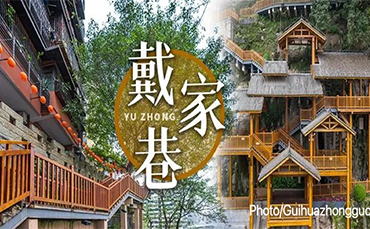

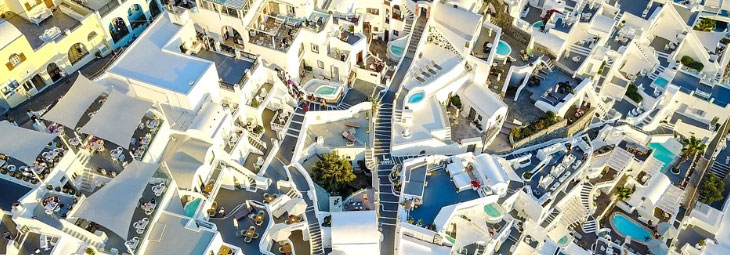
As a mountainous city, Chongqing's alleys and lanes are full of different splendor, and the unique scenery Will make you marvel at nature's creation and the artistry of mankind. Daijiaxiang is one of these wonderful old streets.
Hidden in the mountains and alleys, and built on the cliff, Daijiaxiang embodies the centuries-old past and new life of the Bayu mountain city, serving as a unique landscape along the Jialing River. The Daijiaxiang Old Street Renewal and Reconstruction Project is located in the Jiefangbei Business Circle of Yuzhong District, close to the Hongyadong Scenic Spot, occupying an area of approximately 45 acres. It aims to build a recreational area that combines a nostalgic humanistic old street with a relaxing area on the city wall overlooking the river;and a sightseeing area on the cliff walkway;and an experience area of Yu flavor of life, showcasting the beauty of Chongqing in the ancient and modern times in the prosperous part of the city.
The Daijiaxiang cliff walkway covers an area of nearly 10,000 square meters, with the landscape walkway originating from Daijiaxiang Old Street and extends to the bank of Jialing River, with a length of about 750 meters, featuring 300 meters of suspended trestles with a height difference of nearly 60 meters.
Daijiaxiang can be called a cultural axis with Hongyadong to borrow each other's momentum, looking at the river view at the same time you can take in all the historical and cultural relics. The lane is mainly characterized by cliff walks, which are dangerous, and the traces of footstools remain on the cliffs, serving as the "living fossil" of the Bayu culture.
Most of Chongqing's ancient city walls were built on cliffs, and none is more dangerous than the section of the Hongyacheng Wall on the Daijiaxiang Cliff Walk. The Hongyacheng Wall is located between Linjiang Gate and Hongya Gate, the cliff winds deeply down from Feixianyan to the east. There are remnants of hammock buildings, stone carvings of Feixianyan, and sun-drenched sprinkled slopes on the cliffs below the city wall. Historically, Yuzhong District has experienced four times of city construction. During the Ming Dynasty, Dai Ding carried out the fourth expansion, forming seventeen city gates with "nine openings and eight closures" with more than 8,000 meters of city wall. This section of the city wall is located between Hongyamen and Linjiangmen, and the two gates as well as the city wall are built on top of the high cliff.
The Daijiaxiang Old Neighborhood Renewal Project was honored with the 2023 China Habitat Award for Exemplary Cases and was chosen as a model for urban renewal by the Ministry of Housing and Urban-Rural Development (the first batch). The renewal of Daijiaxiang not only connects a number of traffic fortresses such as Hongyadong and Jiefangbei, but also takes advantage of its original location to build a cliff walkway, as well as gathers brands with local characteristics to build a lifestyle scene. Daijiaxiang allows visitors to experience the characteristic landscape of Chongqing while enjoying the real fireworks of immersing themselves in the life between neighbors.
1) The previous generations.
Yuzhong District is the core of Chongqing's central city, and is also the "mother city" for the older residents, where the essence of Chongqing's mountainous city, river city, and city of night is concentrated. The northern part of Yuzhong District has always been a bustling one, with the Jiefangbei shopping district, Hongyadong, Chaotianmen and other well-known attractions. Daijiaxiang, on the other hand, is located in the hidden corner of this bustling area, a "gray zone" that is hard to reach by modern transportation, and the bustle of the downtown area has not spread to this area. Most of the existing buildings were built in the 1970s and 1990s, and the area was once a bustling place for merchants and businessmen. However, with the decline of dock transportation, it gradually turned from a bustling commercial center into a dilapidated shantytown on the edge of a cliff. On the scale of modern life, Daijiaxiang's streets and alleys are cramped. Most of the houses there have outstanding problems such as leaking roofs, dilapidated façades, poor pipeline networks, haphazard construction, and fire hazards, which have been evaluated by the government as "affecting the appearance of the city". The river cliffs are overgrown with weeds, and they rise approximately 60 meters from the base to the top, lacking connecting channels. connecting channels. This geographical feature makes travel for residents inconvenient and poses potential risks of landslides and other hazards.
The two primary challenges of Daijiaxiang are its difficult accessibility due to its deep entrance and the inconvenient transportation.
Before the renovation, residents could only enter and exit the area by following the alleys next to Linjiang Road and the Second Hospital of Chongqing Medical University, and through a narrow alley under the Linjiang Road overpass, which was also their only two entrances. Friends from out of town can only get a glimpse when they come to try the famous Dinghuanghuang hot pot. However, before the renovation of Daijiaxiang, most people still regard it as a dilapidated old town, lacking the motivation to explore further. Daijiaxiang crowd portrait is also quite complex, with relatively low housing prices, a high occupancy rate, and a diverse consumer base,
behind these conditions can also be seen in Daijiaxiang before the transformation of the scene is less than the optimistic state.
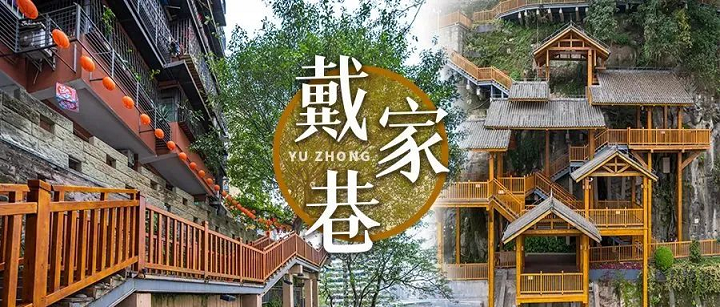
Photo/Guihuazhongguo
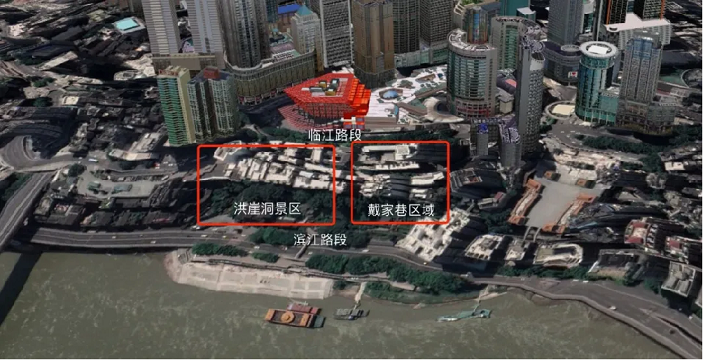
Daijiaxiang near Riverside Road has a height difference of nearly 60 meters and was a cliff before the transformation. [Photo/Guihuazhongguo]
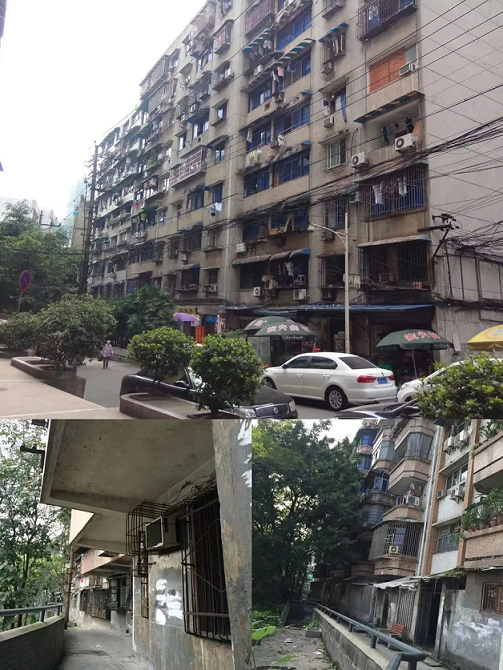
Daijiaxiang before renovation. [Photo/Guihuazhongguo]
Source: <https://mp.weixin.qq.com/s/j4-Yx5ttIGxon3ZuVzOiMg>
Edited and Translated by Guan Tao